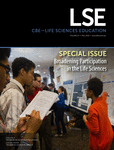Fine-Tuning Summer Research Programs to Promote Underrepresented Students’ Persistence in the STEM Pathway
Abstract
Although the importance of undergraduate research experiences in preparing students for graduate study and research careers is well documented, specific examination of program components is needed to assess the impact of these programs on underrepresented (UR) students. The Leadership Alliance, a consortium of leading PhD-granting and minority-serving institutions (MSIs), has leveraged its diverse partnership to place UR students from MSI and non-MSI institutions in competitive research environments through its national Summer Research Early Identification Program. Using longitudinal pre/post data collected from student surveys, we applied social cognitive career theory as a conceptual framework to examine how research engagement, skill development, and mentorship aspects of a summer research program affect students’ commitment to pursue research careers. Self-reported knowledge of research skills, time engaged in research activity, and students’ understanding of and attitudes toward pursuing graduate study were measured in relation to the classification of students’ home undergraduate institution, level of students’ pre-existing research experience, and demographic factors. Our results provide evidence of specific programmatic components that are beneficial for UR students from varying academic and cultural backgrounds. This study describes important aspects of summer research programs that will contribute to students’ ability to persist in science careers.



